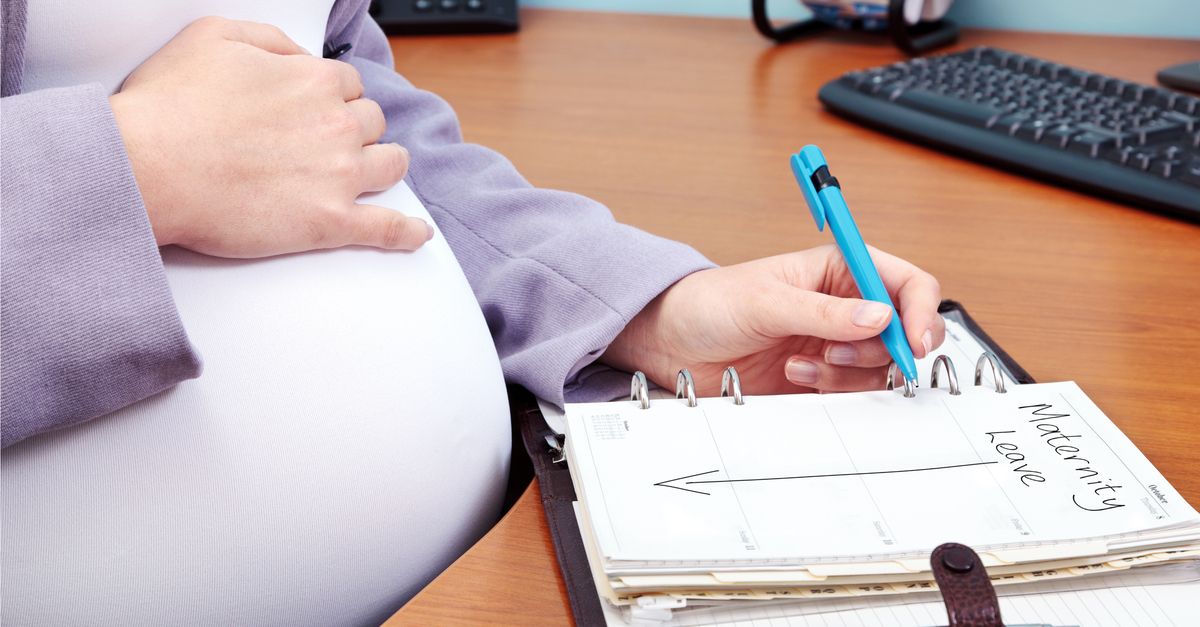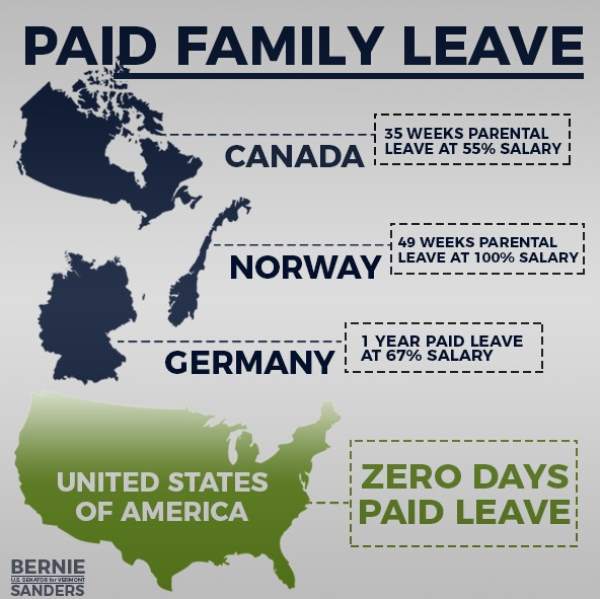On 14 March 2017, Sen. Bernie Sanders' (I-VT) office posted an image on his Facebook page criticizing the lack of federally-funded family leave in the U.S. by highlighting how similar policies are implemented in three other countries:
Sanders, who ran for the Democratic Party's 2016 presidential nomination, expressed support for a federal family leave program in the U.S., as stated on his campaign website:
In my view, every worker in America should be guaranteed at least twelve weeks of paid family and medical leave. That’s why I am a proud cosponsor of the FAMILY Act, introduced by Senator [Kirsten] Gillibrand, which does just that. Under this measure, every employee would receive twelve weeks of paid family and medical leave: to take care of a baby, to help a family member who has been diagnosed with cancer or another serious medical condition, or to care for themselves if they become seriously ill.
This would be funded through an insurance program, like Social Security. Workers would pay into it with every paycheck, at the price of roughly one cup of coffee per week. There is no reason not to pass this bill now.
His office's claim that the U.S. and Papua New Guinea are alone "out of 188 countries" in lacking federal family leave programs is based on a 2015 study by the International Labour Organization (ILO) reporting that statistic. Sanders' post was also accompanied by an image listing individual claims about parental leave policies in Canada, Germany, and Norway.
Canada allows parents to take 35 weeks' worth of leave while still receiving up to 55 percent of their regular salaries. The country's paid leave benefits are applied as part of its employment insurance (EI) program, which states:
For most people, the basic rate for calculating EI benefits is 55% of your average insurable weekly earnings, up to a maximum amount. As of January 1, 2017, the maximum yearly insurable earnings amount is $51,300. This means that you can receive a maximum amount of $543 per week.
While parents can divide the 35 weeks of leave between themselves, mothers can take an additional 15 weeks as part of the program:
EI maternity benefits can be paid for a maximum period of 15 weeks. You cannot receive EI maternity benefits beyond 17 weeks after the expected or actual week of childbirth, whichever of the two is later.
EI parental benefits can be paid for a maximum period of 35 weeks. The payments must be made within 52 weeks of the week your child was born or the week your child was placed with you for adoption.
Parents seeking to take the paid leave must also meet criteria regarding length of employment, and while parental benefits are open to "biological, adoptive, or legally recognized parents while they are caring for their newborn or newly adopted child," maternity benefits are only available to a child's biological mother:
To be eligible for EI maternity benefits, you must have accumulated at least 600 hours of insurable employment in your qualifying period. If you are a self-employed fisher, you must have earned $3,760 from fishing during the 31-week qualifying period immediately before the start of your benefit period.
To be eligible for EI parental benefits, each parent who applies for benefits must have accumulated at least 600 hours of insurable employment in his or her qualifying period. If you are a self-employed fisher, you must have earned $3,760 from fishing during the 31-week qualifying period immediately before the start of your benefit period.
In Norway, as Sanders' office stated, parents may take 49 weeks of parental leave while receiving 100 percent of their pay. But the Norwegian government's web site also notes that parents have another option that provides lesser coverage for a longer period of time:
When you apply for parental benefit, you must choose between 100 percent or 80 percent degree of coverage The total benefit period for parental benefit in the case of a birth, is 49 weeks at 100 percent coverage, and 59 weeks at 80 percent coverage. The parents must choose the same degree of coverage.
Expectant mothers are also required to use three of their benefit weeks prior to their child's birth and can start using their benefits up to 12 weeks before the child's due date, though only nine of those weeks would be withdrawn from their accrued leave time.
Adoptive parents also have two options: take 46 weeks off while receiving 100 percent of their pay, or take 56 weeks off at 80 percent of their pay.
In Germany, there are two ways to take parental leave, one of which is mentioned in the post by Sanders' office: parents can each take between two and 12 months off while receiving "two-thirds of [their] previous income." Benefits range from at least 300 Euros a month to a maximum of 1,800 Euros a month. (Unemployed parents are also eligible for the benefits program.)
Parents who are already employed are each protected from losing their jobs while utilizing their family leave. However, parents taking the time off together can extend their benefits period to 14 months. Additionally, parents who participate in the "ElterngeldPlus" program can also add four months to their leaves if they each work up to 30 hours a week during their benefit period.
Parents seeking to take part in Germany's parental leave program must submit applications to their employer (if applicable) at least seven weeks before they intend to start taking the time off. Additionally, as of 1 July 2015 parents are eligible for up to 24 months of parental leave if their children are between the ages of two and seven.


